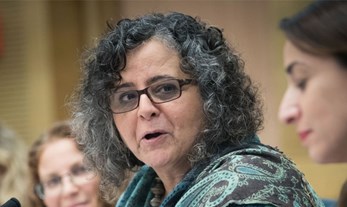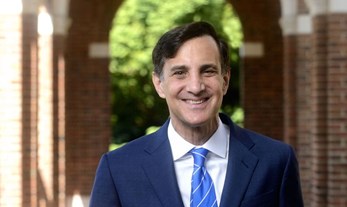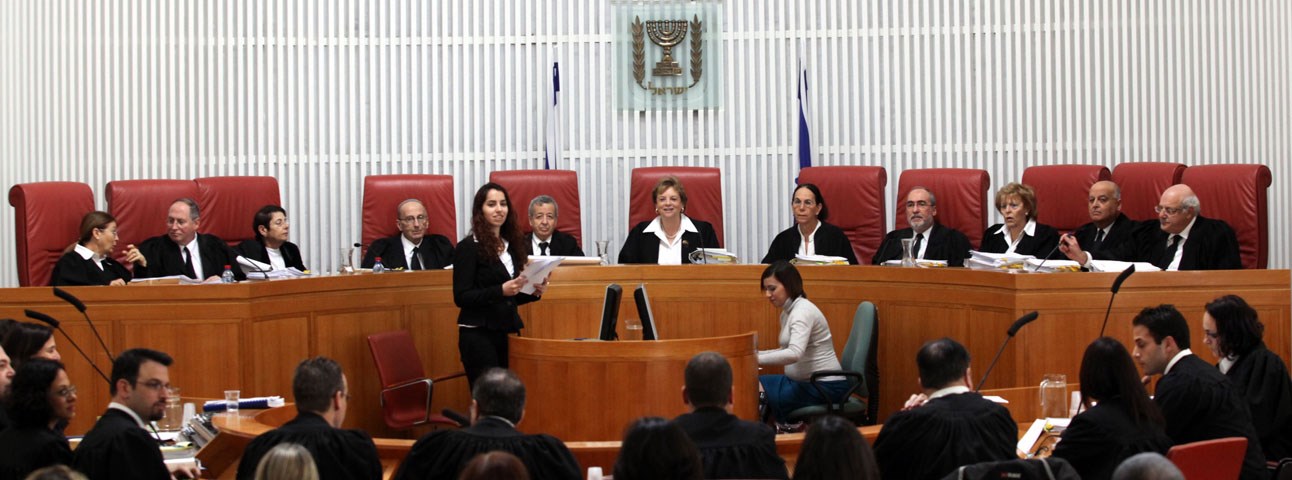


The Inaugural Annual Statistical Report on Arab Society in Israel
The Annual Statistical Report on Arab Society was published today for the first time by the Israel Democracy Institute. The Report provides an overview of the changes that have taken place in Arab society in recent decades in a number of fields, including education, employment, and lifestyle.

Statistical Report on Arab Society in Israel: 2021
Written By: Dr. Nasreen Haddad Haj-Yahya, Dr. Muhammed Khalaily, Dr. Arik Rudnitzky, Ben Fargeon
Arab society in Israel is being revolutionized by the rise in the standard of living, life expectancy and education, along with the decline in fertility rates, changes to family structures, and an increasing desire to realize individual aspirations at the expense of collective values.

A More Hospitable Policy Towards Ukrainian Asylum Seekers
Written By: Prof. Yuval Shany
Israel should adopt a more hospitable policy towards Ukrainian asylum seekers and afford them with short-term stay permits

Israelis Support the West’s Policies on Russia Press Release
The Israeli Voice Index for February 2022 found that almost half of Israelis (48%) support the current policy of western countries to impose harsh sanctions on Russia but not to engage directly with military force. 37% of those surveyed believe that a military intervention is the preferred course of action.

Israelis Support the West's Policies on Russia
Written By: Prof. Tamar Hermann, Dr. Or Anabi
The Israeli Voice Index for February 2022 found that almost half of Israelis (48%) support the current policy of western countries to impose harsh sanctions on Russia but not to engage directly with military force. 37% of those surveyed believe that a military intervention is the preferred course of action.

Women in Israeli Politics: 2022
Written By: Prof. Ofer Kenig
As we mark International Women’s Day, there are a record number of women are in the Knesset (35) and in the government (9) but most senior government positions are still held by men.

Women, Go for It!
Written By: Dr. Idit Shafran Gittleman
The IDF, like every other state institution in Israel, is obligated to the principle of equality – meaning that any woman who is capable of doing so must be permitted to serve in elite combat units

Arab Women Call Out to Arab Men: Let's Join Forces
Written By: Dr. Nasreen Haddad Haj-Yahya
Closing the gender gap is crucial to closing social and economic gaps overall - Arab men and women must work together towards this goal

Arab Residents of Mixed Cities: A Snapshot
Written By: Dr. Nasreen Haddad Haj-Yahya, Adv. Oded Ron, Ben Fargeon
This study aims to provide an up-to-date snapshot of the current situation in mixed cities alongside a description of trends in Israel’s mixed cities over time, in five closely related fields—welfare, education, higher education, employment, and crime—by presenting data collected over a period of time, as a critically important input to sound policymaking.

Women’s Service in the IDF: Between a ‘People’s Army’ and Gender Equality
Written By: Dr. Idit Shafran Gittleman
Over the years and especially in recent decades, the concept of gender equality has also become relevant to the discussion of military service, and more and more roles have been opened up to women serving in the IDF. Dr. Idit Shafran Gittleman presents an overview of women in the IDF since its establishment.

The Next Goal: A Law to Bolster Israeli Democracy
Written By: Yohanan Plesner
This task is certainly feasible. Unfortunately, the current political reality in the Knesset seems to indicate that we are still a long way from achieving this ideal.

The Legal Battle Between Russia and the World
Written By: Prof. Yuval Shany
The clash between Putin’s Russia and international institutions is a shock to the existing world order.

Johns Hopkins University President Ron Daniels Named Chair of IDI’s International Advisory Council
Ronald J. Daniels, the President of Johns Hopkins University, is the new Chair of the Israel Democracy Institute’s International Advisory Council (IAC). He succeeds Prof. Gerhard Casper, President Emeritus of Stanford University, who chaired the IAC since its founding chair, the late U.S. Secretary of State George P. Shultz, stepped down in 2014.

Israelis Out of Work as a Result of COVID-19
Written By: Daphna Aviram-Nitzan, Yarden Kedar
New IDI survey finds that 250,000 Israelis, who are not working, and not receiving unemployment allowances, might soon be forced to rely on supplemental income support.

English Studies for Ultra-Orthodox Boys - Study
Written By: Dr. Ariel Finkelstein
A new IDI study finds that 26% of ultra-Orthodox men say they don’t know English at all and an additional 28% say their English is "poor."

Prof. Suzie Navot Appointed the Israel Democracy Institute’s Vice President of Research
Prof. Suzie Navot has been appointed Vice President of Research at the Israel Democracy Institute where she will join IDI President Yohanan Plesner, Vice President of Research Prof. Karnit Flug and Vice President of Strategy Dr. Jesse Ferris on IDI’s management team.

Quis Custodiet Ipsos Custodiet—Who Will Guard the Guards
Written By: Prof. Yuval Shany
The temptation to make excessive use of spyware and the apparent failure of the current oversight mechanisms compel a significant reinforcement of existing mechanisms. The creation of a new independent commission to monitor online surveillance is necessary.

A New Basic Law Providing Constitutional Protection to the Right to Due Process should be Enacted
Written By: Dr. Amir Fuchs, Dr. Guy Lurie
The text proposed in the draft bill of a new Basic Law: Rights during Interrogation and in Criminal Proceedings, must be revised, because its scope is too narrow. Although the bill is a welcome initiative, it should be expanded and lead to the Knesset's passage of a Basic Law that provides constitutional protection of the right to due process and its derivative rights.

Employment Incentives for the Haredi Community are a Mix of ‘Carrots’ and ‘Sticks’
Written By: Dr. Gilad Malach
Finance Minister Liberman’s employment incentives for members of the ultra-Orthodox (Haredi) community are a "mix of ‘carrots’ and ‘sticks’ and could encourage members of the Haredi community to join the labor market - however elements of the plan could also expand the existing trend of part-time employment.

Anti-Terror Tools Should Not be Used by Civilian Police Forces
Written By: Dr. Tehilla Shwartz Altshuler, Brigadier-General (ret) Itai Brun
The debate as to how to define surveillances software in legislation, and when it may or may not be used misses the point entirely. The bigger question is if law enforcement agencies should be using anti-terror technologies at all.

Suspected Illegal Police Surveillance Necessitates New Legislation and Enforcement
Written By: Yohanan Plesner , Dr. Tehilla Shwartz Altshuler
"If these reports prove true, the activities attributed to the police cast a shadow on Israeli democracy and the rule of law and imply an appalling lack of respect for the checks and balances between the branches of government that form the basis of all democracies"

The Israeli Public Has a Right to Know About Illegal Surveillance
Written By: Dr. Tehilla Shwartz Altshuler, Adv. Amir Cahane
Innocent Israelis should have the right to know about illegal surveillance– and the appropriate tools at their disposal to hold those responsible accountable for infringements on their privacy.

Noa Barak-Weshler Named Director of Media and Marketing for the Israel Democracy Institute
Noa Barak-Weshler is the new Director of Marketing and Media for the Israel Democracy Institute. In this capacity she will run its Spokesperson’s and Public Relations office, including responsibility for public campaigns, online conferences, and branding.

Half of Israelis Think That Judges Rubber-Stamp Surveillance Warrants
Written By: Prof. Tamar Hermann, Dr. Or Anabi
A large majority of Israelis justify surveillance in cases of suspicion of security transgressions, criminal or pedophilic activity. Only a minority justifies such measures in cases of anti-government activity.

Israel’s ‘Selfie’ – The 2021 Israeli Democracy Index
Written By: Yohanan Plesner , Prof. Tamar Hermann
Yohanan Plesner and Prof. Tamar Hermann discuss the 2021 Israeli Democracy Index presented to President Isaac Herzog earlier this month. Published annually since 2003, the Democracy Index provides an in-depth assessment of Israeli democracy based on a comprehensive survey of public opinion. The Index’s analysis of survey findings creates a database for informed decision-making among policymakers seeking to strengthen Israeli democracy.

Israeli Police: From Warrantless Cellphone Searches to Controversial Misuse of Spyware
Written By: Adv. Amir Cahane
Israel’s rules governing privacy and related laws have experienced a dramatic past few weeks. These developments started with an Israeli Supreme Court ruling in favor of relaxed rules governing cellphone search warrants and ended with an expose revealing that Israeli police have been using NSO Group spyware allegedly without warrants or explicit statutory authorization.

NSO in Israel: Would You Let the Police Handle Uranium?
Written By: Dr. Tehilla Shwartz Altshuler, Adv. Amir Cahane
NSO-Israel Police affair proves we need to rethink the way we oversee surveillance technologies. The solution: Israel needs a privacy czar

The NSO Affair – What is Allowed and What is Forbidden in Online Surveillance?
Written By: Dr. Tehilla Shwartz Altshuler, Adv. Amir Cahane
Does the law allow the use of spyware against any citizen, and who oversees the process? Is there any way of knowing if we are being followed? IDI experts explain

The Tenure on the Bench of Supreme Court Justices
Written By: Dr. Guy Lurie
Among assertions that a limited tenure for justices would prevent excessive influence by past governments on the current composition of the Supreme Court bench and allow the current government to replace a larger number of justices - what is the average tenure of Israeli Supreme Court justices?

The NSO Scandal Should be an Earthquake for the Israel Police
Written By: Dr. Tehilla Shwartz Altshuler
Recent media reports alleging that the police are using controversial surveillance software to spy on Israeli citizens has troubling implications and the current Protection of Privacy Law is not equipped to cope with today’s reality. Israel badly needs new legislation that is up to the challenges of the information age.

